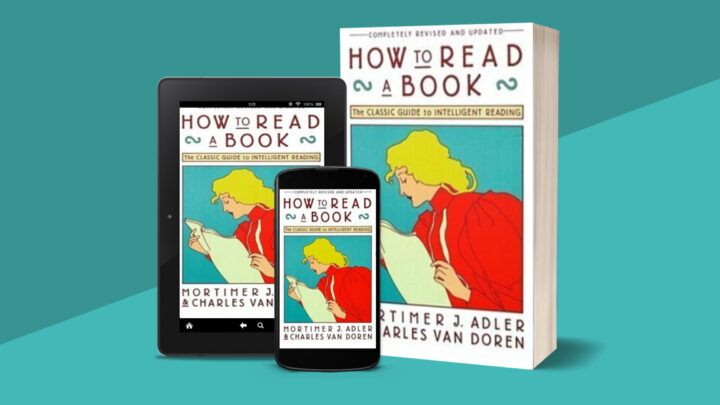
How meta is it to read a book called “How to Read a Book”? Since I technically listened to this one, perhaps the argument can be made that I listened to a book about how to read because I need to listen to books less and read them more?!
None of that is the point. This was a thought-provoking book. In fact, I ordered a physical copy from the library because I needed to see some of this in print, especially to implement some of the tactics laid out in the book (which was originally written in 1940 and most recently revised in 1972. I’m not even sure that audiobooks were very common back then, let alone e-readers like the Kindle.
My biggest takeaway had to do with the importance of pre-reading a book that I hope to learn something from. Pre-reading involves up to an hour of work, which may include:
- Reading through the table of contents, noting the overall content and flow of the book.
- Reading the jackets of the book.
- Reading the conclusion (if there is one, or just the last few pages, which typically summarize the book’s main points)
- Perusing the index to note what things are mentioned in the book and how often.
- Skimming through 2-4 random places in the book to get a feel for the writing style of the author.
Those were mentioned in this book, written before the common use of the internet. So, to these, I would add my suggestions:
- Check out a summary either in print or a YouTube video to get an overview
- Read the author’s bio online to get a better feel for the point of view the author is coming from. This is likely in the book jacket, but an online search might reveal more interesting details.
Debatable:
- Read reviews for the book. On the one hand, it can be helpful to read what people liked about it and the consensus about this book. On the other hand, you might taint your appreciation of the material and just be participating in groupthink. If you can maintain the proper mindset and only read a few reviews or view the general star-level rating for the book, it might let you know if you are walking into a 1-star dud with poor editing and lackluster thoughts or something that countless others are saying changed their lives.
Of course, if your primary methods of reading a book are e-readers and audiobooks (like myself), then this is going to be difficult. Skipping around an e-reader is possible, though less enjoyable than the physical equivalent. I did, however, discover some interesting capabilities of the Kindle. You can easily view the notes and highlights of other readers, leading you immediately to some of the most inspiring parts of the book and seeing whether they all occur in one section or are spread throughout. You can also easily save your highlights for future reference, which is one of the main reasons I love reading on a Kindle.
For audiobooks, keeping notes is much more difficult. In general, I am listening to audiobooks while doing something else (driving, walking, housework). However, I am always on my phone when listening to them, so I try to tell Siri to “remind me” with a quote from the book or an inspirational thought. I then transfer that to a note-taking app with a document for that book. There is also the ability to add bookmarks to an audio file and review later, but this requires picking up the phone and using it, which isn’t recommended while driving and is tedious to go back to.
All-in-all I found the time to read this book to be well worth it, and it will continue to shape my experience of books in the future. So far, I have been ordering physical copies from the library of many audiobooks I enjoy to have something to peruse and skim before writing a review or key takeaways.
Is it more tedious? Yes, for sure. But the goal of reading for learning isn’t to make it through as many books as possible in a given amount of time; it’s to squeeze meaning and/or inspiration out of them. To add the extra 1-2 hours needed to pre-read, and then to leave reviews on Goodreads to synthesize your thoughts and then have a reference file for each book you’ve read…that time is well worth it.